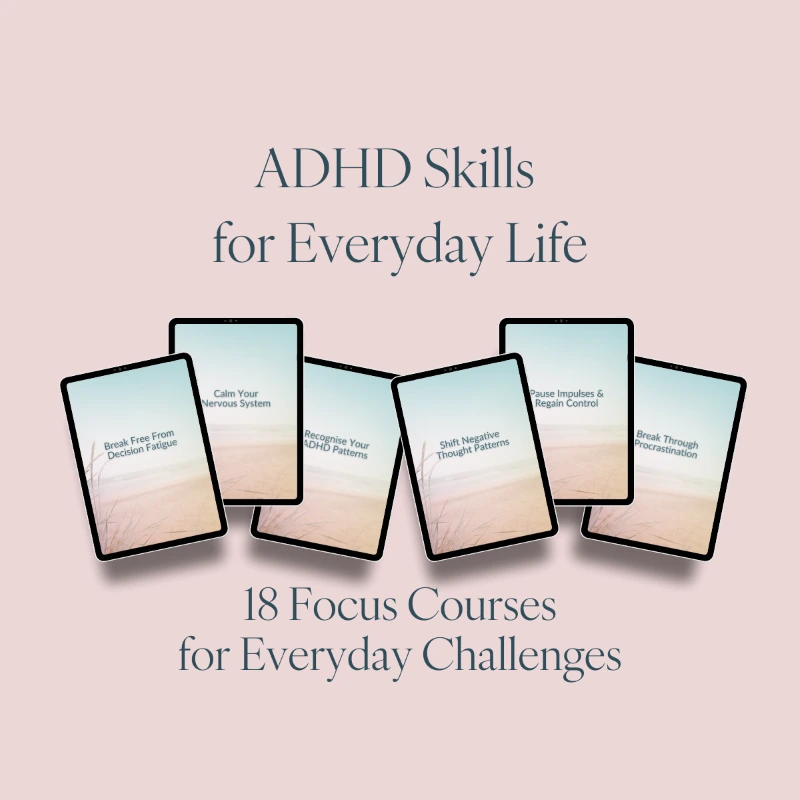You know the feeling. One small thing goes wrong, someone’s tone in a meeting, an unexpected email, your child asking what’s for dinner, and suddenly, a wave crashes over you. You’re not just upset or annoyed. You’re flooded.
For people with ADHD, this kind of emotional overwhelm isn’t overreacting. It’s not being “too sensitive.” It’s a real part of how the ADHD brain processes emotion, and it’s exhausting.
What Is Emotional Overwhelm?
Emotional overwhelm occurs when your brain and body feel overloaded. In the space of a few minutes, you might feel tearful, angry, panicky, or frozen, or all of the above.
For some people, it shows up as snapping at someone you love. For others, it’s going completely quiet and shutting down. It can look like procrastination, overthinking, or suddenly feeling like you’re failing at everything.
And with ADHD, this kind of overwhelm can hit fast and hard, even if the trigger seems small.
Why Is It So Common in ADHD?
People with ADHD often experience something called emotional dysregulation, basically, the brain struggles to filter, manage, and respond to emotion in a balanced way.
This means:
- You might feel things more intensely
- It’s harder to let things go, even when you know you’re overthinking
- Your emotional responses can feel like they come out of nowhere
- Once you’re overwhelmed, it isn’t easy to shift out of it
You might also be dealing with rejection sensitivity (where even neutral feedback can feel personal), perfectionism, and years of feeling “too much.” It’s no wonder your nervous system is always on high alert.
How Emotional Overwhelm Shows Up
Everyone experiences it differently, but here are some common ways it shows up in my clients:
- Snapping or withdrawing in conversations
- Struggling to think clearly when under pressure
- Crying over things that feel “silly” later
- Panic when plans change suddenly
- Feeling like one small mistake ruins your whole day
- Avoiding tasks because you’re scared you’ll “mess them up.”
Sometimes, it’s unclear what triggered it, your brain hits capacity and flips the switch.
This Isn’t Just About Emotions, it’s About Capacity
The ADHD brain is constantly filtering noise, distractions, and stress. Add in hormones, poor sleep, work demands, or sensory overload, and suddenly, there’s just no room left to cope with anything else.
When you hit that wall, it’s not because you’re weak. It’s because your brain tries to protect you by shutting things down. Unfortunately, it doesn’t always pick the most helpful way to do that.
What Helps?
Here are some key techniques that you can put in place that will help you in the moment:
- Name it
- Sometimes, just saying “I’m overwhelmed” or “I’m at capacity” helps your brain register what’s happening. It creates a pause.
- Step away early
- Notice your early signs (tight chest, irritability, fidgeting, zoning out). Build in tiny breaks before the flood hits.
- Lower the bar
- This isn’t the time to power through. Ask yourself: What needs to happen right now, and what can wait?
- Practice self-praise
- Even if all you did was step away and not explode, that’s worth recognising.
- Work on long-term strategies
- In coaching, we often examine how to build resilience and reduce daily overload so that one does not constantly live on the edge of shutdown.
You’re Not Too Much
If you’ve ever been told you’re overreacting, too emotional, or hard to handle, I want you to know this: you’re not too much. You’ve just been carrying too much.

Reaching Out for Support
If emotional overwhelm is a daily battle, you don’t have to keep pushing through alone. Professional support such as Coaching or Counselling can give you practical tools and space to feel more in control, at work, at home, and with yourself.
If emotional overwhelm is something you’re dealing with regularly, you may find my Calm Overwhelm and Press Reset course helpful. It’s designed to support ADHD brains with practical, grounding tools you can return to whenever things start to feel too much.



